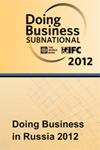Overview
Doing Business in Russia 2012 is the second report in a series analyzing four areas of business regulation across 30 Russian cities—starting a business, dealing with construction permits, getting electricity, and registering property. These indicators were selected because they cover areas of local jurisdiction or practice. Trading across borders, which was included in the first round, has been replaced by the getting electricity indicator. In 2008, quantitative indicators on business regulations were analyzed for 10 cities: Irkutsk, Kazan, Moscow, Perm, Petrozavodsk, Rostov-on-Don, Saint-Petersburg, Tomsk, Tver and Voronezh. This year's report documents improvement in these cities and expands the analysis to 20 additional cities: Kaliningrad, Kaluga, Kemerovo, Khabarovsk, Surgut, Kirov, Murmansk, Novosibirsk, Omsk, Samara, Saransk, Stavropol, Ulyanovsk, Vladikavkaz, Vladivostok, Volgograd, Vyborg, Yakutsk, Yaroslavl and Yekaterinburg.
Where is it easiest to do business in Russia?
Main Findings
- Overall, it is easier to start a business, deal with construction permits, get electricity and register property in Ulyanovsk and Saransk.
- No single city outperforms the others in all areas. It is easiest to start a business in Saint Petersburg, deal with construction permits in Surgut, connect to electricity in Saransk and register property in Kaluga.
- The average start-up cost of 2.3% of income per capita places Russia among the 30 cheapest economies worldwide to start a business.
- Property registration is easy (similar to the OECD average of 5 procedures and 31 days) and inexpensive across the country and in all cities measured. The average cost of 0.2% of property value is well below the OECD average of 4.4% of property value.
- Consistent performers stayed at the top with Kazan among the top performers in the areas of starting a business and registering property. Irkutsk remained in the top third of cities measured for starting a business and dealing with construction permits.
- Numerous procedures take a long time and carry a high cost in the areas of dealing with construction permits and getting electricity.
The report was funded by the Ministry of Economic Development of the Russian Federation, 26 participating regions and one municipality; and by the European Union, represented by the European Commission. The report was produced in collaboration with the Higher School of Economics and the Institute of Urban Economics.


